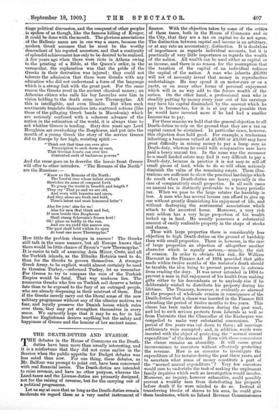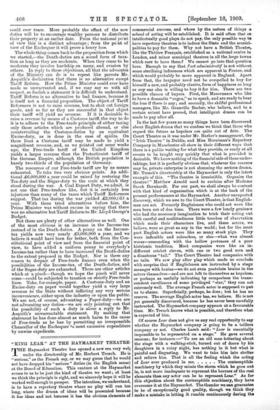THE DEATH-DUTIES AND EVASION.
debates in the House of Commons on the Death- 1 have been more than usually interesting, and it is a misfortune that they did not come earlier in the Session when the public appetite for Budget debates was less sated than now. For one thing, these debates, as Mr. Balfour was prompt-to point out, have been concerned with real financial issues. The Death-duties are intended to raise revenue, and have no other purpose, whereas the Land-taxes and the License-duties are primarily designed, not for the raising of revenue, but for the carrying out of a political programme.
Let us say at once that as long as the Death-duties remain moderate we regard • them as a very useful instrument of finance. With the objection taken by some of the critics of -these taxes, both in the House of Commons and in the City, that they are a tax on capital we do not agree. The distinction hetween capital and income is an arbitrary, or at any rate an accountancy, distinction. It is doubtless of importance as regards individual accounts, but it is practically of very little importance as regards the wealth of the nation. All wealth can be used either as capital or as income, and there is no reason for the assumption that the taxation of the capital of an individual reduces the capital of the nation. A man who inherits £6,000 will not of necessity invest that money in reproductive undertakings. He may spend it on motor-cars or on a yacht, or on many other forms of personal enjoyment which will in no way add to the future wealth of the nation. On the other hand, a professional man who is steadily putting by money every year out of his earnings may have his capital diminished by the amount which he pays in Income-tax, for it is at any rate possible that he would have invested more if he had had a smaller Income-tax to pay.
For these reasons we hold that the general objection to all Death-duties merely on the ground that they are a tax on capital cannot be sustained. In particular cases, however, this objection does hold. good. For example, a tradesman inheriting a business valued at £5,000 or £6,000 may have great difficulty in raising money to pay a lump sum as Death-duty, whereas he could. with comparative ease have paid a heavy annual tax. In the same way the successor to a small landed estate may find it very difficult to pay a Death-duty, because in practice it is not easy to sell off small pieces of land, while to do so will often seriously diminish the value of the remaining estate. These illus- trations are sufficient to show the practical hardships which do result when Death-duties are heavy, especially in the case of comparatively small properties. In all such cases an annual tax is distinctly preferable to a heavy periodic tax. When we pass to the large estates the hardship is less. A man who has several houses can afford to give up one without greatly diminishing his enjoyment of life, and without destroying the sentimental associations which attach to the ancestral home. Moreover, a very rich man seldom has a very large proportion of his wealth locked up in land. He usually possesses a substantial amount of easily realisable property in the shape of stocks and shares.
Thus with large properties there is considerably less objection to high Death-duties on the ground of hardship than with small properties. There is, however, in the case of large properties an objection of altogether another character which is equally serious,—namely, the risk of evasion. In order to obviate this risk, Sir William Harcourt in the Finance Act of 1894 provided that gifts made within twelve months of the testator's death should be taxable, the idea being to prevent persons in eztremis from evading the duty. It was never intended in 1894 to prevent a man in full enjoyment of his health from making gifts either to his descendants or to anybody else if he deliberately wished to distribute his property during his lifetime. The Treasury, however, is evidently so alarmed at the prospect of wholesale evasion in consequence of the Death-duties that a clause was inserted in the Finance Bill extending the period of twelve months to five years. This clause has been under discussion during the past week, and led to such serious protests from Liberals as well as from Unionists that the Chancellor of the Exchequer was compelled to make very substantial concessions. The period of five years was cut down to three; all marriage settlements were exempted ; and, in addition, words were inserted with the object of protecting the " normal annual expenditure" of the deceased. Even with these concessions the clause remains an absurdity. It will cause great inconvenience to executors without effectively yrotecting the revenue. How is an executor to investigate the expenditure of his testator during the past three years, and to ascertain what sums of money constitute a part of the " normal annual expenditure " ? Very few executors would care to undertake the task of making the unpleasant family inquiries which such an investigation would involve. Moreover, no inquiry, however exhaustive, could possibly prevent a wealthy man from distributing his property before death if he were minded to do so. Instead of transferring blocks of shares to his sons, he could give them banknotes, which no Inland Revenue Commissioners could ever trace. More probably the effect of the new duties will be to encourage wealthy persons to distribute their property at an earlier date. From the national pint of view this is a distinct advantage ; from the pont of view of the Exchequer it will prove a heavy loss.
The whole thing comes back to the proposition from which we started,—the Death-duties are a sound form of taxa- tion as long as they are moderate. When they cease to be moderate they involve hardship on many, and evasion by others. In reply to these objections, all that the advocates of the Ministry can do is to repeat like parrots Mr. Asquith's declaration that there is no alternative except Tariff Reform. How the Prime Minister could ever have made so unwarranted and, if we may say so with all respect, so foolish a statement it is difficult to understand. Tariff Reform is no alternative to bad finance, because it is itself not a financial proposition. The object of Tariff Reformers is not to raise revenue, but to shut out foreign goods, and so far as they are successful in that object their tariff will yield no revenue. If it is desirable to raise a revenue by means of a Customs tariff, the way to do it is to adhere to the Free-trade principle of either taxing only those articles which are produced abroad, or else countervailing the Customs-duties by an equivalent Excise-duty, as is done in the case of spirits. On these lines a Customs tariff may be made to yield a magnificent revenue, and, as we pointed out some weeks ago, the Free-trade tariff of the 'United Kingdom yields a larger revenue than the Protectionist tariff of the German Empire, although the British population is barely two-thirds of the population of Germany.
The resources of our Free-trade tariff are by no means exhausted. To take two very obvious points. An addi- tional £6,000,000 a year could be raised by restoring the Tea-duty and the Sugar-duty to the scale at which they stood during the war. A Coal Export Duty, we admit, is not one that Free-traders like, but it is certainly less injurious than many of the taxes which Tariff Reformers suggest. That tax during the war yielded .22,000,CO3 a year. With these tried alternatives before him, the Prime Minister was without excuse in saying that there was no alternative but Tariff Reform to Mr. Lloyd George's Budget.
But there are plenty of other alternatives as well. One of the most obvious is an increase in the Income-tax instead of in the Death-duties. A penny on the Income- tax yields now very nearly £3,000,000 a year, and we believe it would have been far better, both from the Con- stitutional point of view and from the financial point of view, to have added a uniform penny to everybody's Income-tax rather than to have increased the Death-duties to the extent proposed in the Budget. Nor is there any reason to despair of Free-trade finance even when the possibilities of the Income-tax, of the Death-duties, and of the Sugar-duty are exhausted. There are other articles which at a pinch—though we hope the pinch will never come—could be subjected to taxation on strictly Free-trade lines. Take, for example, paper. A Customs-duty and an Excise-duty on paper would together yield a, very large revenue to the State without inflicting any very serious inconvenience, either upon the industry or upon the public. We are not, of course, advocating a Paper-duty—we are not advocating any duties—we are only pointing out that the possibility of such a duty is alone a reply to Mr. Asquith's unwarrantable statement. By making that statement he has done almost as much harm to the cause of Free-trade as he has by permitting an irresponsible Chancellor of the Exchequer fo meet excessive expenditure by unwise expedients.











































 Previous page
Previous page